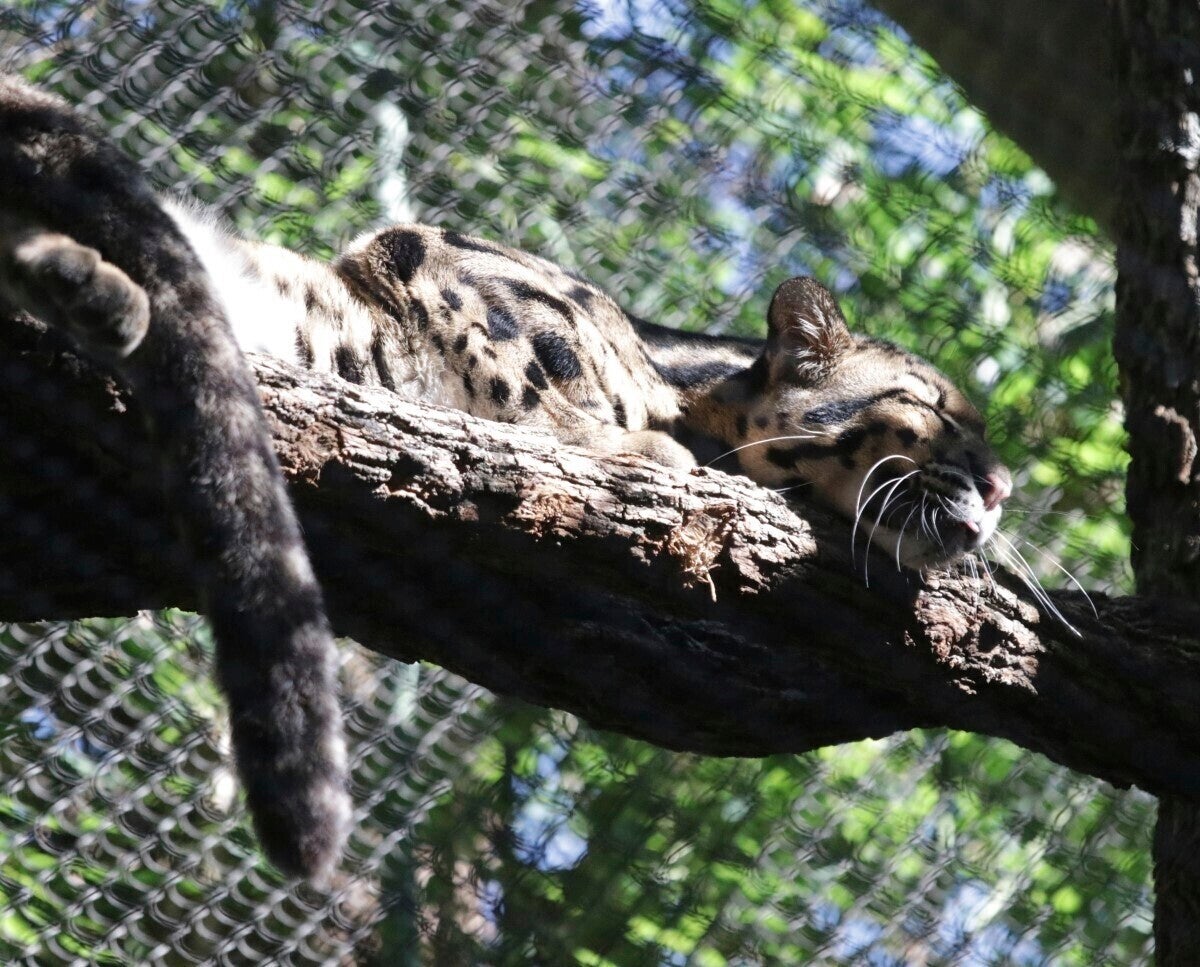Two stolen monkeys, slashed fences and a dead vulture: What is behind the strange incidents at the Dallas Zoo?
The missing monkeys have been recovered, but the mystery surrounding their disappearance and other unusual incidents at the zoo remains a question, Graig Graziosi reports


It wan an anonymous tip that sent the Dallas police to an abandoned house in Lancaster, Texas.
They entered and began their search on Tuesday afternoon, focusing – based on the tipster’s information – on closets inside the empty home.
Before long, they peeled open a wooden closet door and were relieved to find the tipster’s information was correct. Inside, they found a pair of emperor tamarin monkeys named Bella and Finn that had apparently been stolen from the Dallas Zoo, approximately 15 miles away.
The news of the monkeys’ disappearances – and a slew of other strange occurrences at the zoo over the last month – made national headlines on Monday. Photos of the little monkeys and their mustache-like white whiskers were shared on social media alongside a security image of a man in a blue hoodie holding a bag of Doritos that police wanted to question regarding the pilfered primates.
The drama kicked off on Monday when animal care specialists at the zoo discovered the monkeys had gone missing. They searched the zoo grounds and the surrounding area for the creatures, but were unsuccessful.
Zoo officials said at the time it would be unlike the monkeys to venture far from their home at the zoo’s enclosure, noting in a statement that "emperor tamarin monkeys would likely stay close to home."
Dallas Zoo president and CEO Gregg Hudson told the Dallas Morning News that it was immediately clear that "the habitat had been intentionally compromised," which police confirmed later, saying the enclosure had been cut open.
"We looked as much as we could out in the cold and we were hoping that maybe we’d find them, but it became pretty apparent to us just by looking at what they’d done that this was motivated to try to steal the animals," Mr Hudson said.

By early Tuesday morning, police had made public only one potential lead; a man in a blue hoodie with a bag of Doritos whose image was captured on security footage near the enclosure. The Dallas police department said they wanted the man for questioning, but did not say he was a suspect. It’s unclear if he is still wanted for questioning in the wake of the monkeys’ discovery.
After the monkeys were recovered from the abandoned house in Lancaster, police shared a photo of one of the primates perched atop what appears to be a section of chain-link fencing wedged inside a closet. The monkeys were returned to the zoo and are being checked by veterinarians before they’re returned to their enclosure.
The incident prompted the Association of Zoos & Aquariums, which advocates for the advancement of zoos and aquariums in addition to offering sought-after accreditation for the organisations, to issue a statement condemning the alleged theft of the monkeys and assuring the public that the zoo was not at risk of losing its accreditation.
"Dallas Zoo and its animals are victims of acts, presumably intended to take animals for personal reasons, or worse, to be trafficked," Dan Ashe, the AZA’s president, wrote. "AZA and its entire member community stand squarely with Dallas Zoo and condemn these acts of violence against the zoo, its animals, and the entire Dallas community."
The AZA’s statement theorised on possible motives: personal desire to own the animals, or perhaps animal trafficking.
Though it is difficult to track exact numbers, a 2021 study published in the Public Library of Science journal roughly estimated that international wildlife trafficking made approximately $3.2bn in 2013, but noted that it used a conservative estimate and suggested the current estimates are far lower than their likely reality in 2023.
International wildlife trafficking was the fourth largest transnational illegal activity, just behind narcotics sales, human trafficking, and product counterfeits, according to the study.
But if it was simply a case of someone hoping to score an exotic new pet or to turn a profit on the animals, how does it explain the other strange incidents at the zoo over the past month?
The Dallas Zoo was not just the victim of monkey theft; a week before the incident, a 35-year-old lappet faced vulture – an endangered species – was found dead in its enclosure.
According to the zoo’s website, vultures are the "most endangered group of birds" in the world, with 16 of the 23 known vulture species "considered threatened, endangered, or critically endangered."
The bird, named Pin, had reportedly died from an unusual wound that zoo officials said would not have been the result of a natural incident. The zoo called the loss "devastating" and offered a $10,000 reward for information regarding its death.
Prior to that, zoo officials discovered that one of their two clouded leopards, Nova, had gone missing. Dallas police responded to the situation, using drones to search the grounds and surrounding trees for the cat.
Unlike poor Pin, Nova was found a few hours after the discovery no worse for wear. The 25 pound cat posed no threat to humans during her short time outside her enclosure and was quickly reintegrated to her habitat.
More worrying was the discovery that Nova was able to escape due to a cut that had been made in her enclosure, according to the Dallas Morning News. Later that day, zoo officials discovered that a similar cut had been made to the enclosure of a group of langur monkeys, much like the one that would later provide someone access to the tamarind monkeys that disappeared.
The incidents prompted the zoo to upgrade its security with more surveillance cameras and an expanded roster of overnight security guards.

However, even with the beefed up security presence, someone was still able to sneak in, compromise an enclosure, and steal a pair of monkeys without detection.
The situation has become so strange that the Fort Worth Zoo – approximately 36 miles west of the Dallas Zoo – has increased its own security presence to prevent any would-be animal thieves from trying the same tactic there, according to the Fort Worth Star-Telegram.
But the question remains; if theft was the sole intent behind the incidents at the zoo, why did the individual not take Nova, the leopard, and why did Pin the vulture end up dead?
Those answers may be forthcoming. The Dallas Zoo said Wednesday it was celebrating the safe return of Bella and Finn, and noted that any further information regarding the investigation would come from the Dallas police, if they come at all.
There may be no satisfying answer to the strange attacks on the zoo’s facilities, as was the case in 2018 when 11 animals were stolen from the Santa Fe College Teaching Zoo in Gainsville, Florida.
The then-director of the facility, Johnathan Miot, spoke to Slate about his experiences in the aftermath of the thefts, and revealed that he never received a satisfactory answer regarding why the perpetrators stole the animals.
"We ask that all the time. Even with our case, we never got the answer," he told the outlet. "The individuals involved in our situation were found and prosecuted and held accountable, but what we never got was a why."



